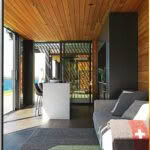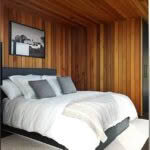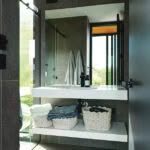The nomadic couple behind Expedition Earth returns to nest in a two-pod tiny house in the Far North
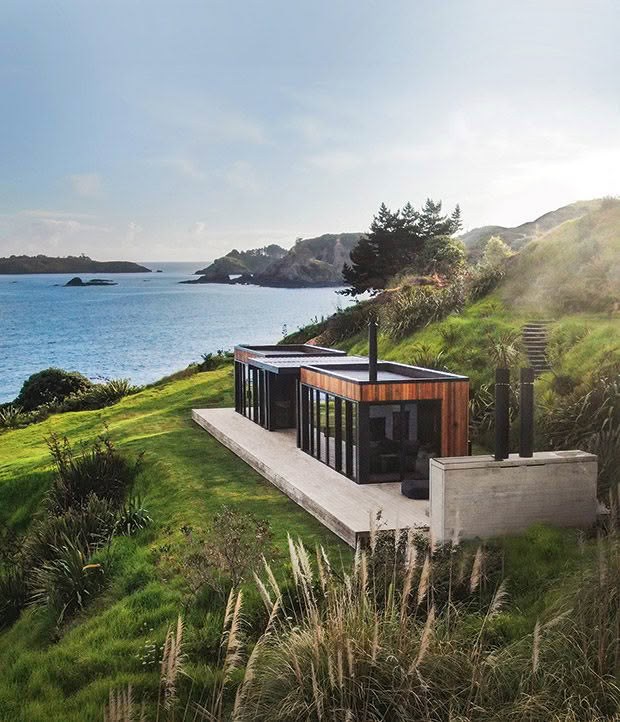
For two years, this couple traveled in a Jeep throughout the Americas, the length of Africa and into many of Europe’s far-flung corners — often facing great danger. But the lessons they learned together on the road will drive them into an exciting future.
Words: Kate Coughlan Photos: Jane Ussher
Sometimes it is easy to mark the start of a journey; other times, it seems half over before it has even begun. NZ Life & Leisure first met fashion entrepreneur Bridget Thackwray and former rock band bass guitarist Topher Richwhite in issue 85 (NZ Life & Leisure, May/June 2019).
Then, they were involved with a project they called Expedition Earth, a global road trip that turned into a journey of self and environmental discovery, chronicled on Instagram. They’d set out in Canada in 2018 with the purchase of a second-hand Jeep they named Gunther in honour of the legendary lifetime road traveler Gunther Holtorf, their inspiration.
But their biggest ‘trip’ — or life experience — started a short time before they ever jumped in Gunther on an epic adventure to discover some of the world’s most remote and beautiful spots. It began on Pakiri Beach, north of Auckland, in surf powered by the tail end of a tropical cyclone.
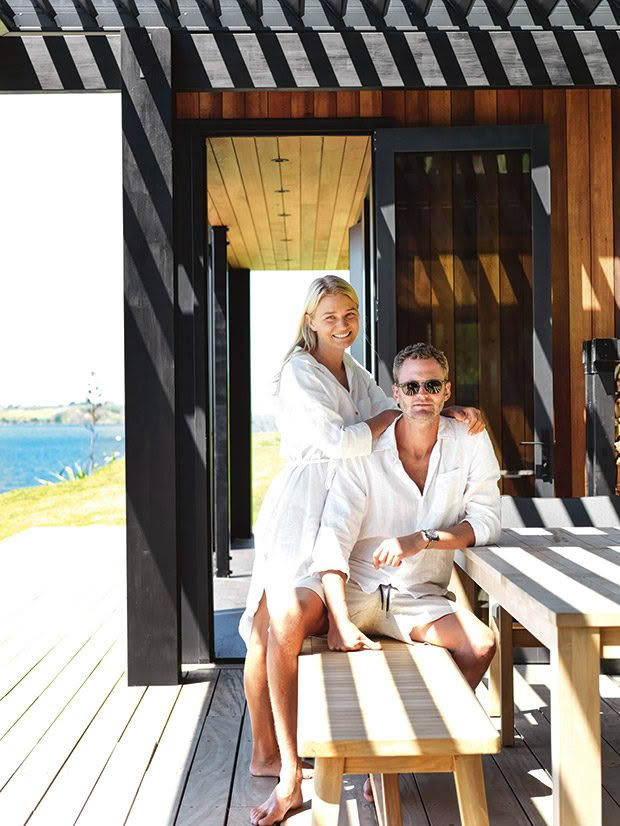
“We have been very fortunate to stay in incredible lodges and hotels on our journey and have taken inspiration from them in different ways,” says Bridget. “Blue Lagoon [a geothermal spa in southwestern Iceland] inspired the juxtaposition between the house, lawn, view and decking. We also took ideas from Sasaab Lodge in Kenya, where they have found a practical way of using indoor/outdoor living space.”
Then, they were “newly mets” checking out the other’s quotient of adventurousness on a first date. Bridget had seen Topher — years before she was to meet him — performing at a sell-out London concert with his band, the Lonsdale Boys Club, without realizing he was a fellow Kiwi.
Five years later, they met at his family’s holiday home on Great Mercury Island when she arrived to talk to a potential investor about her start-up online fashion-marketing company.
“I knew from the first moment I saw him,” she says. “But, Topher, he constantly plays hard to get.” “Bridget is a huge optimist,” says Topher, “and I am more of a sceptic.” “He’d never had a girlfriend before and didn’t know if he wanted one. He’d been in a rock band, so it wasn’t like he didn’t know girls, but he hadn’t had a girlfriend.”
They arranged to meet a few days later for a swim at Pakiri, and each admired the other’s guts in tackling the cyclone-churned surf. “Afterwards, we were walking along the sand, and Bridget leaned down, picked up a small shell and handed it to me.
“I thought, ‘This perfect scallop shell is like this girl’s heart; beautiful and delicate. And I want to protect it.’ I put the shell in my pocket and reckoned, ‘I will propose to Bridget with this shell one day.’”
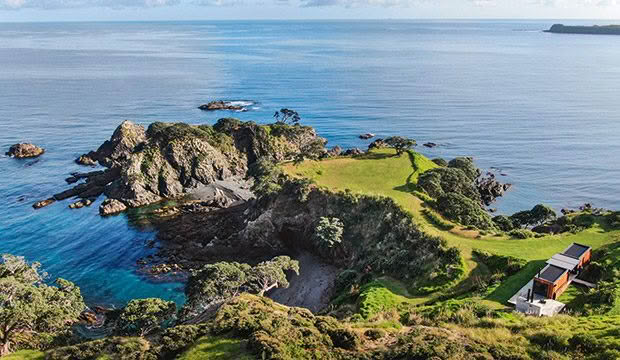
Bridget Thackwray and her sisters grew up on this four-hectare property on Northland’s Mahinepua Peninsula overlooking the Cavalli Islands, which they call Faraway Cove. The home she built there with Topher Richwhite is low maintenance to maximize the couple’s wish to live spontaneously. A robotic mower, called Toto, takes care of any grass threatening the magnificent view.
The baby scallop shell stayed safely in storage in Auckland as the pair, just three months later, set out on Expedition Earth. Their route required traversing some of the world’s most dangerous roads (crime-ridden in Southern Africa and physically treacherous in Northern Russia) as well as thousands of kilometres of boredom and discomfort.
They swam with turtles in the Galapagos, did a spot of penguin-spotting in Antarctica and once blindly entered a gun-friendly protest in rural Ecuador. They were never a foot away from each other at any one moment.
Friends and family were astonished that the pair who met, dated for a month, split for a month (due to Topher’s reticence to accept that he’d found his first girlfriend) and then got back together for a month were to set off together to far-flung places.
Bridget’s family, the Thrackwrays of Mahinepua Peninsula, are adventurous types. Her late father was Phil, the founder of Thackwray Yachts, which built the Spirit of New Zealand. Her mother Andrea is an innovator in tourism marketing. They told their daughter: “Oh well, if you split up, just fly home.”
Topher’s friends and family (also adventurous types in the entrepreneurial world of Fay Richwhite & Co) were concerned that Topher, so inexperienced in the way of girlfriends and so tall (1.95 metres), should be heading off to live full-time with a girl in a vehicle that allowed only two square metres of shared space.
In the years and 200,000 kilometres that followed, it was Topher’s resourcefulness in facing armed Sudanese bandits or Bridget’s guts in driving on treacherously narrow roads that were crucial to their survival and grew their attraction into love. “We set out in the lust period of the relationship,” says Bridget and surmises that they both tried hard to please the other and learned their roles in doing so. “There are lots of distractions on the road, so you are not focusing on each other. Maybe that makes it a good place to date?” Topher wonders.
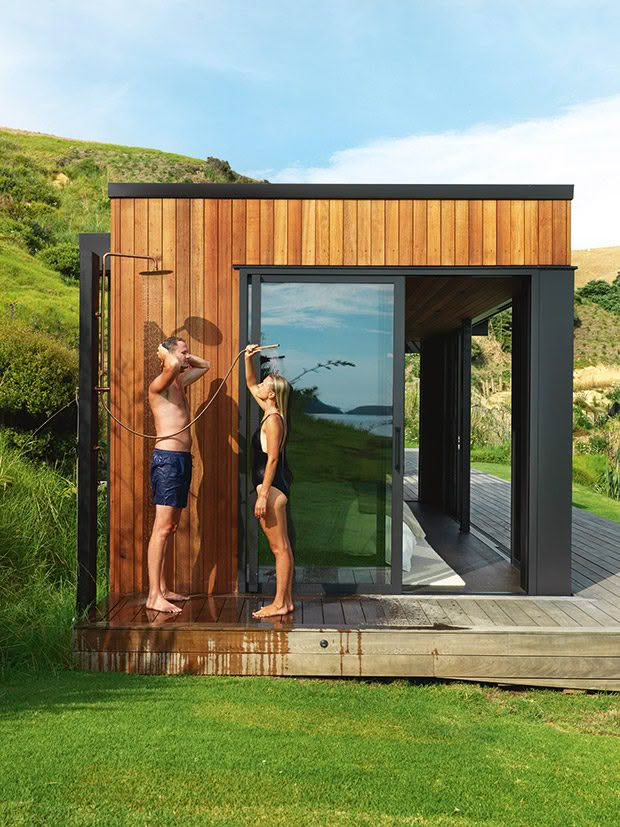
“Good weather is our Achilles’ heel,” she says. “We can go snorkeling from the beach, or we launch the boat from in front of the cabin and head to the Cavalli Islands. This coastline is not only beautiful, it’s teeming with sea life.”
Such “distractions of the road”, as he euphemistically calls the daily dangers, led to his mother becoming so overwhelmed with anxiety her blood pressure shot to dangerous levels. Bridget’s mother also lived in a constant state of distressed alert.
Bridget and Topher are not the world’s best worriers. He says she fears animals, and she says he is scared of people. If their research about places showed terrifying things ahead, they simply stopped researching and forged on anyway.
“Perhaps we were naïve,” Topher says. He lived in significant fear every moment of the African leg of Expedition Earth and was more than relieved to get out alive and unharmed.
When a pandemic arrived — instead of the expected BBC crew scheduled to join them to document their journey into Russia’s remote Yamal Peninsula — a warning to “Get home now” came via satellite phone.
- The couple chose natural materials for the internal finishes to maintain the sense of the Far North environment.
- “We decided against having curtains in our bedroom and wake with the dawn. An advantage of not drinking alcohol is waking refreshed,” says Topher.
They raced for Moscow, driving for six days and nights on the frozen rivers that provide the only roads on the peninsula, praying the spring thaw hadn’t arrived early. (Poor Gunther, abandoned in a Moscow airport car park, is under threat of seizure by Russian bureaucrats if Topher doesn’t get back by the end of March to drive the Jeep out of Russia. Plans are unfolding.)
Back in New Zealand, a decision to build a tiny house on land Bridget’s father had left her (as part of a piece left to all his four daughters) on a peninsula in the Far North seemed the best way to use their enforced stillness.
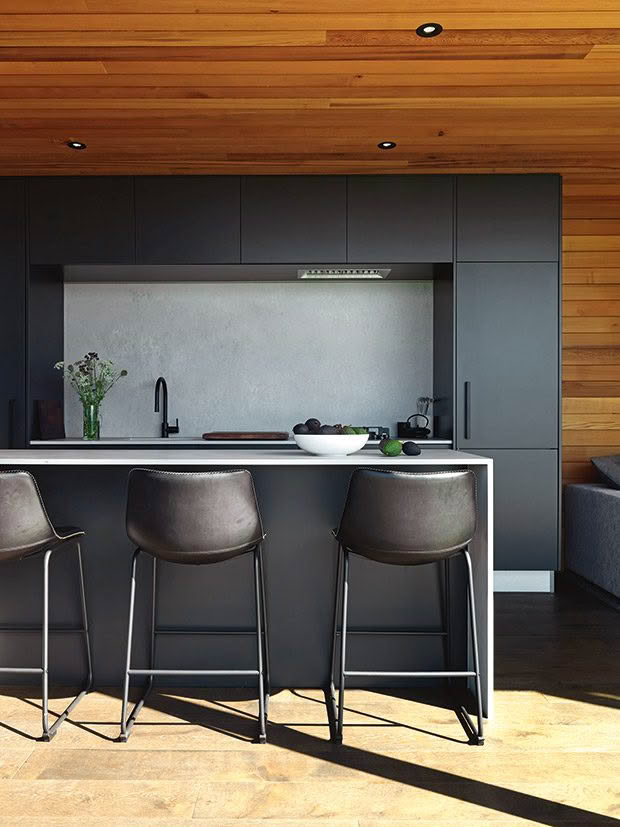
Bridget says she and Topher have such similar tastes they independently chose identical material for a specific finish from a crowded range of options. “We met in the middle of the showroom saying we’d each discovered the perfect thing and found we were holding the same sample.”
On a headland they call Faraway Cove, and by a tree they call the Faraway Tree, they planned and built Faraway Cabin. The building of the house went hand-in-hand with another journey the pair had embarked upon as they drove Gunther north towards that frozen place with a name that means “end of the earth”.
As they planned how to survive in such a bitter northern Siberian wilderness, they made a decision that continues to power their life today. “On 17 January, we both celebrated two years completely sober,” says Topher. This decision is part of the big picture driving them.
“When you see how hard people in undeveloped places are working to make their lives better and with so little, you become aware of how we, in lucky countries, can waste so much. Drinking too much, partying and not using the opportunities we are born into. Spending the next 70 years of our lives hungover in the morning or looking forward to the next party wasn’t the way we wanted to live,” says Bridget.
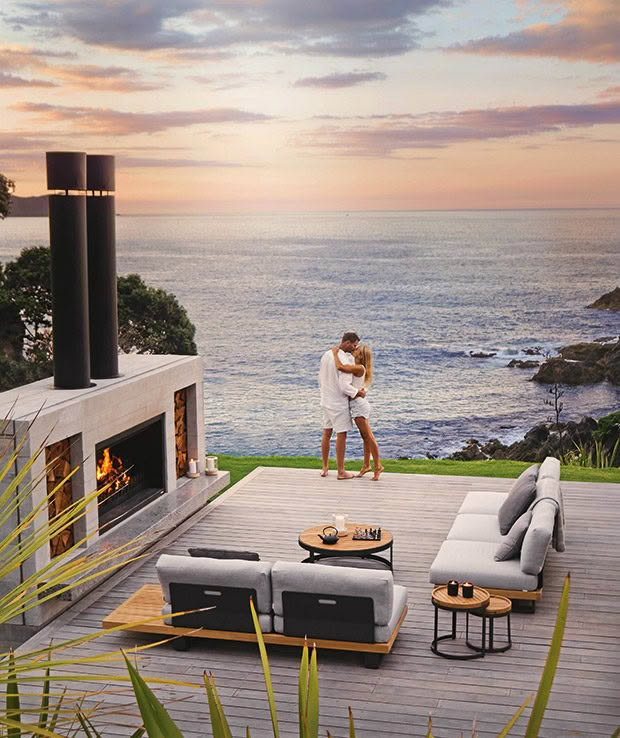
Faraway Cove is often alive with the sound of music. “I am passionate about speakers and have quite an almighty sound system,” says Topher. “We each have turns at playing a variety of music throughout the day, but it usually ends with opera at sunset, reverberating around the cove”.
“We wouldn’t have been drinking on that leg of our journey anyway, so we decided to do it together. If you give up drinking, it is a perfect opportunity to give up smoking — as they go hand-in-hand. Neither of us does drugs, but I smoked a lot of cigarettes, more than a pack a day, so that was tough — way harder than giving up alcohol,” says Topher of his successful battle to kick Madame Nicotine out of his life.
“We are all-in or all-out sorts of people, so for us, it was a challenge, but our lives are definitely better,” Bridget says. Says Topher: “Exercising that discipline muscle has taught me a lot. We get to achieve more with our days by waking up early with the daylight, making the bed and going for a swim rain or shine. “Right until the time we go to bed, we are living a far more healthy and rewarding life as a result.
“I’ve realized that alcohol provided me with the façade of an extrovert when I was probably an introvert the whole way through my band career.” Says Bridget: “We wanted to use the expedition to change ourselves and to reflect on our lives and what we could change. This is one of the biggest changes we have made off the back of it.
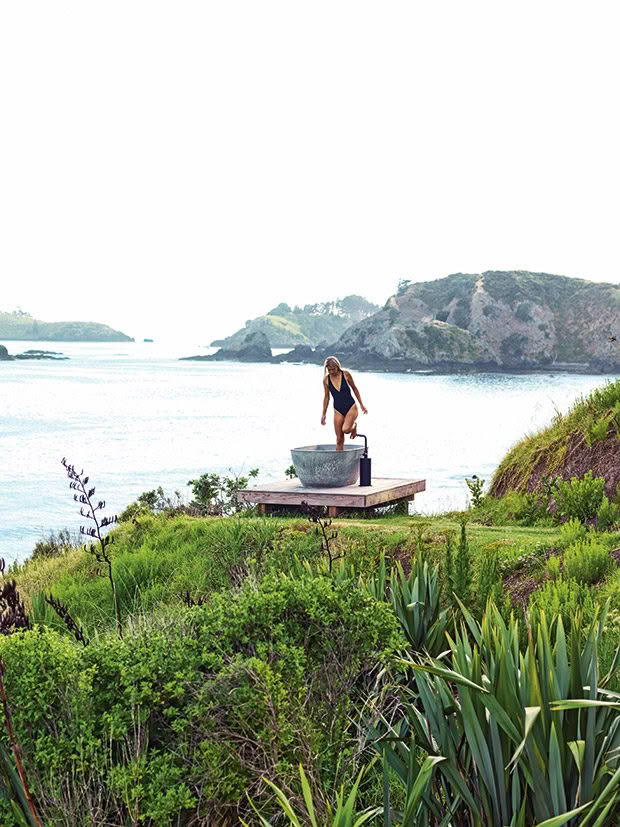
The perfectly positioned bath, a prototype made specifically for the couple by Raw Concrete Design, which normally makes contemporary concrete sinks, was a birthday present to Topher from Bridget.
We didn’t want the whole Expedition Earth to fade into memories and be something we did in our 30s. It needed to be something that made us better people in the long run. I’ve become very interested in history, which I think, at the age of 28, is an unpopular thing to talk about at dinner parties, and Topher has become very interested in politics.”
The designing and building of their tiny house — well, two tiny houses with a Louvretec roof above — became an all-consuming project over the past year. “The landscape is outstanding, and we felt a responsibility to create a house that was worthy of it by using natural materials and a design that was respectful of it.”
Even as they worked together building the house, they were unsure how they’d cope with the day-to-day living. Especially Topher. “He wanted to test how we would get on in normal life as well as traveling.”
“We went from one extreme to another. Living on the road, moving daily, and suddenly we were in New Zealand in lockdown living in the same house for months. It was good proof that we were able to get along as well, if not better, in one place.”
So it was time to invite their families to Faraway Cove, just after New Year, to celebrate the completion of their tiny house. It was also time for Topher to find that little scallop shell Bridget had given him on Pakiri Beach one stormy evening years ago.
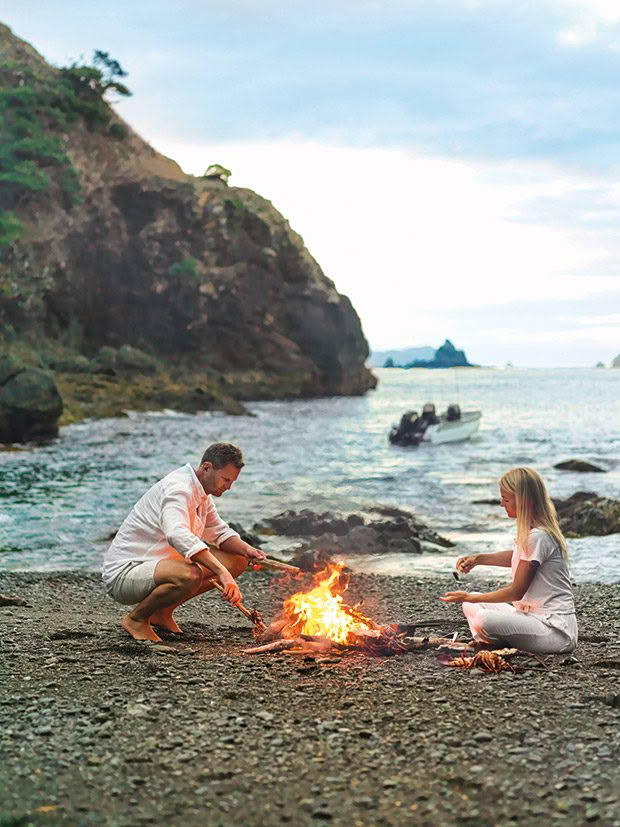
Sharing the property with sisters means getting together most evenings to cook on the Kamado Joe (a ceramic grill smoker) and play 500 — or chess if it’s just Topher and Bridget. And planning more adventures.
Surrounded by their families, Topher spoke of the completion of the house and their joy in the project and without Bridget knowing what he was about to say next, he leaned forward, opened a small box, drew out the baby shell and asked her to marry him.
The next stage of their journey will be as a married couple. And, as they sit by their big outdoor fire staring out to sea, Topher and Bridget dream of building a yacht and sailing it north from Auckland. They will look up at their Faraway Cove perch high above the sea, wave it farewell and hoist their sails to head off into the Pacific Ocean.
ROOMS WITH A VIEW
The outstanding natural beauty of the land Bridget and her sisters inherited from their father (one building site chosen for each of his four daughters) inspired Topher and Bridget to build with the lightest of footprints. Their two tiny cabins, each 25 square metres, are joined by a floating Louvretek roof.
The couple didn’t think they’d be comfortable living in such small spaces full-time. However, they are finding it easy to work and live here. The difficulty is leaving.
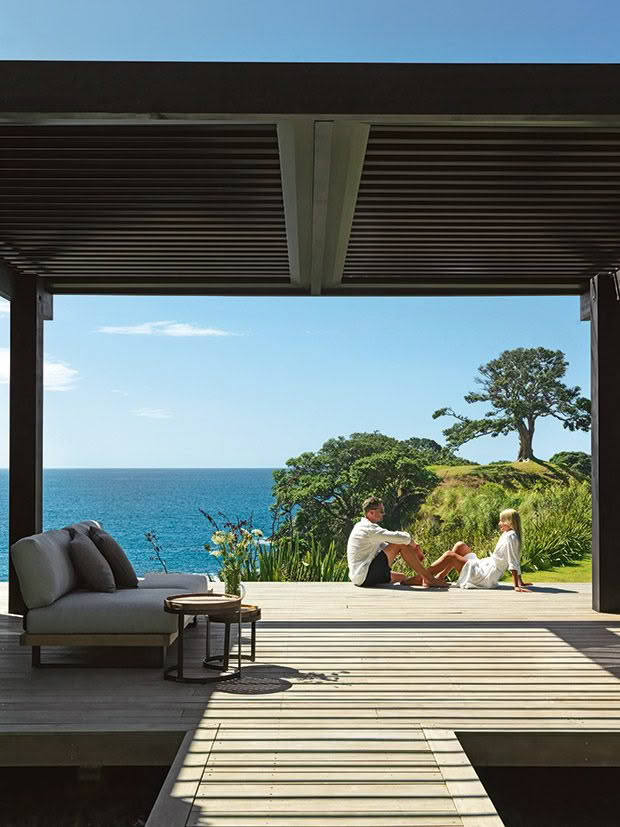
“Rain, hail or shine, our day starts with a swim,” says Topher. “This is followed by an outdoor shower and planning our working day on the project we’re doing with Waikato University. In the morning, the living area becomes an office space. “
In addition to a hospitality business Topher owns in Auckland’s Parnell called the Pineapple Bar, they are working on a project with the University of Waikato. “It is a joint lab, working with their students to refocus tourism more sustainably and preserve outstanding natural landscapes,” he says.
The couple collaborated with architect Jason Van Huenen to design the layout. “Topher and I were involved in every step of the process, including the build. The cabins are the first to be built by Makespace NZ, which got locked down in Auckland, and Topher and I had to finish the house ourselves.” Follow Bridget and Topher at instagram.com/expeditionearth.live
Love this story? Subscribe now!
 This article first appeared in NZ Life & Leisure Magazine.
This article first appeared in NZ Life & Leisure Magazine.
